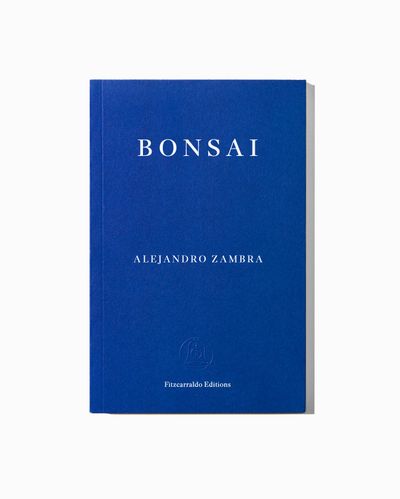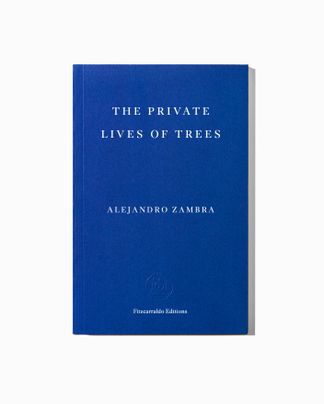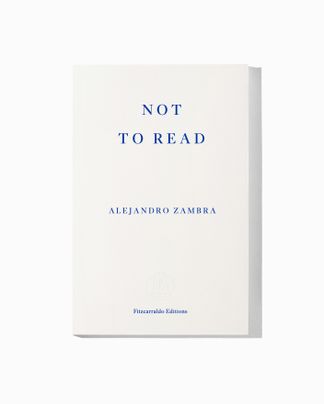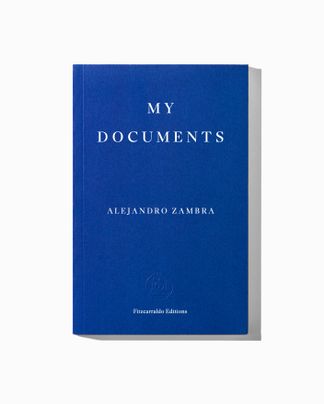Bonsai is the story of Julio and Emilia, two young Chilean students who, seeking truth in great literature, find each other instead. Like all young couples, they lie to each other, revise themselves, and try new identities on for size, observing and analyzing their love story as if it’s one of the great novels they both pretend to have read. As they shadow each other throughout their young adulthoods, falling together and drifting apart, Zambra spins a formally innovative, metafictional tale that brilliantly explores the relationship among love, art, and memory.

Bonsai
Translated by Megan McDowell
French paperback with flaps, 96 pages
Published 17 August 2022
Bonsai
Translated by Megan McDowell
¶ The first lie Julio told Emilia was that he had read Marcel Proust. He didn’t usually lie about his reading, but that second night, when they both knew they were starting something, and that however long it lasted, this something was going to be important – that night, Julio deepened his voice, feigning intimacy, and said that, yes, he had read Proust when he was seventeen, during a summer in Quintero. By that time no one in his family summered in Quintero—not even Julio’s parents, who had met at El Durazno beach, ever went to Quintero, a lovely beach town that according to them just wasn’t what it used to be, now that it had been overrun by the masses. Anyway, Julio said, at seventeen he had commandeered his grandparents’ summerhouse so he could shut himself in and read In Search of Lost Time. It was a lie, of course: he had gone to Quintero that summer, and he had read a lot, but he’d read Jack Kerouac, Heinrich Böll, Vladimir Nabokov, Truman Capote, and Enrique Lihn, not Marcel Proust.
That same night, Emilia lied to Julio for the first time, and the lie was, also, that she’d read Marcel Proust. At first she merely agreed: I read Proust too. But then there was a long, pregnant pause, which wasn’t an uncomfortable silence but rather an expectant one, so Emilia had to complete the story: I read it recently, just last year, it took me like five months, I was really busy, as you know, with classes. But I decided to
read all seven volumes and those were truly the most important months of my life as a reader.
She used that expression: my life as a reader – she said that those had been, without a doubt, the most important months of her life as a reader.
In Emilia and Julio’s story, in any event, there are more omissions than lies, and fewer omissions than truths, truths of the kind that are said to be absolute and tend to be uncomfortable. Over their time together, which wasn’t long but was long enough, they confided in each other their least public desires and aspirations, their disproportionate feelings, their brief and exaggerated life stories. Julio confessed to Emilia things that only his psychologist should have known, and Emilia, in turn, made Julio into a kind of retroactive accomplice to every one of the decisions she had made over the course of her life. The time, for example, at fourteen, when she’d decided to hate her mother: Julio listened attentively and offered the opinion that, yes, fourteen-year-old Emilia had made a good decision, no other decision had been possible, he would have done the same, and, certainly, if they’d been together back then, when they were fourteen, he definitely would have supported her.
Emilia and Julio’s was a relationship riddled with truths, with personal disclosures that quickly built up a complicity they strove to see as unassailable. This is, then, a light tale that becomes heavy. This is the story of two student enthusiasts of the truth, aficionados of deploying words that seem like truth, of smoking endless cigarettes, and of enclosing themselves within the violent complacency of those who believe themselves better and purer than others, than that immense and detestable group called everyone else.
They quickly learned to read the same way, to think similarly, and to hide their differences. Very soon they comprised a vain private world. For a time, at least, Julio and Emilia managed to meld into a single entity. They were, in short, happy. There can be no doubt about that.
II.
TANTALIA
¶ After that they went on fucking, follando, as it were, in other people’s houses and in motels where the sheets smelled like pisco sour. They fucked for a year and that year seemed short to them, though it was actually very long, an unusually long year, at the end of which Emilia went to live with Anita, her childhood friend.
Anita was no fan of Julio’s – she thought he was arrogant and depressive – but she still had to put up with him at breakfast, since he was a permanent guest in the cramped and rather inhospitable apartment that Emilia and Anita shared. Once, maybe to prove to herself and her friend that deep down she didn’t really dislike Julio, she even made him soft-boiled eggs, his favourite. What really bothered Anita about Julio was that he had changed her friend:
You changed my friend.
She didn’t used to be like that.
And have you always been like this?
Like what?
Like this, how you are.
Emilia, conciliatory and sympathetic, intervened. Why would you want to be with someone if they didn’t change your life? She said that, and Julio was there when she said it: that life only made sense if you found someone who would change it, who would destroy your life as you knew it. Anita found the theory a little dubious, but she didn’t argue. She knew that when Emilia used that tone there was no point in contradicting her.
(…)
‘Every beat and pattern of being alive becomes revelatory and bright when narrated by Alejandro Zambra. He is a modern wonder.’
— Rivka Galchen, author of Everyone Knows Your Mother is a Witch
‘The most talked-about writer to come out of Chile since Bolaño.’
— New York Times
‘Strikingly original.’
— James Wood, New Yorker
‘There’s a dreamy associative quality of the novella that made it feel true and beautiful and moving. I left Bonsai feeling a little melancholic ache in my ribs, as though some crucial part of me had been taken away.’
— Brandon Taylor, New York Times
‘Bonsai fulfills one of the requirements of the short novel: the search for perfection … supremely, effectively ambiguous.’
— J. A. Masoliver Ródenas, La Vanguardia
‘Rather than shrink in its conversion to bound covers, as most manuscripts do, Zambra’s text has swelled – and its effect on the world of Chilean literature has been entirely disproportionate to its size.’
— Marcela Valdes, The Nation
‘When I read Zambra I feel like someone’s shooting fireworks inside my head.’
— Valeria Luiselli, author of Lost Children Archive
‘Not a single word is wasted in this powerful, elegantly told story, which traces through a few episodes in the lives of Julio and Emilia, two young people who fall for one another at university – bonding over their love of literature and discussion – then retreat from one another’s lives.’
— Literary Hub
‘At only seventy-four pages, Bonsai seems filled with far more characters, poignant turns, subplots and jokes than it should have room for, reaching far into the peripheral lives of both its protagonists. Its title evoked the novel’s domestic world as well as its own tiny, crafted form.… Bonsai is narrated with … such an intimate, improvisatory frankness, joining together the novel’s many fictions intricately but never whimsically. Zambra effectively captures the ambivalence involved in thinking of one’s life as a story.’
— Louis Rogers, Literary Review
‘Alejandro Zambra’s book is written with stark simplicity, told through short vignettes that give us glimpses of the whole, and this sparsity is what gives Bonsai its cumulative power. We observe almost voyeuristically as the two young lovers slowly find themselves and each other through the books they read together. Their relationship feels authentic and true.’
— Joshua Rees, Buzz Magazine
Alejandro Zambra was born in Santiago, Chile, in 1975. He is the author of Chilean Poet, Multiple Choice, Not to Read, My Documents, Ways of Going Home, The Private Lives of Trees and Bonsai. In Chile, among other honours, he has won the National Book Council Award for best novel three times. In English, he has won the English PEN Award and the PEN/O. Henry Prize and was a finalist for the Frank O’Connor International Short Story Award. In 2023 he won the Manuel Rojas Ibero-American Prize for the totality of his oeuvre. He has also won the Prince Claus Award (Holland) and received a Cullman Centre Fellowship from the New York Public Library. His books have been translated into twenty languages and his stories have been published in the New Yorker, New York Times Magazine, Paris Review, Granta, McSweeney’s Quarterly and Harper’s, among other publications. He has taught creative writing and Hispanic literature for fifteen years and currently lives in Mexico City.
Megan McDowell is an award-winning Spanish-language translator. She has translated books by Alejandro Zambra, Samanta Schweblin, Mariana Enríquez and Lina Meruane, among others, and her short story translations have appeared in the New Yorker, The Paris Review, Harper’s and The White Review. She lives in Santiago, Chile.




